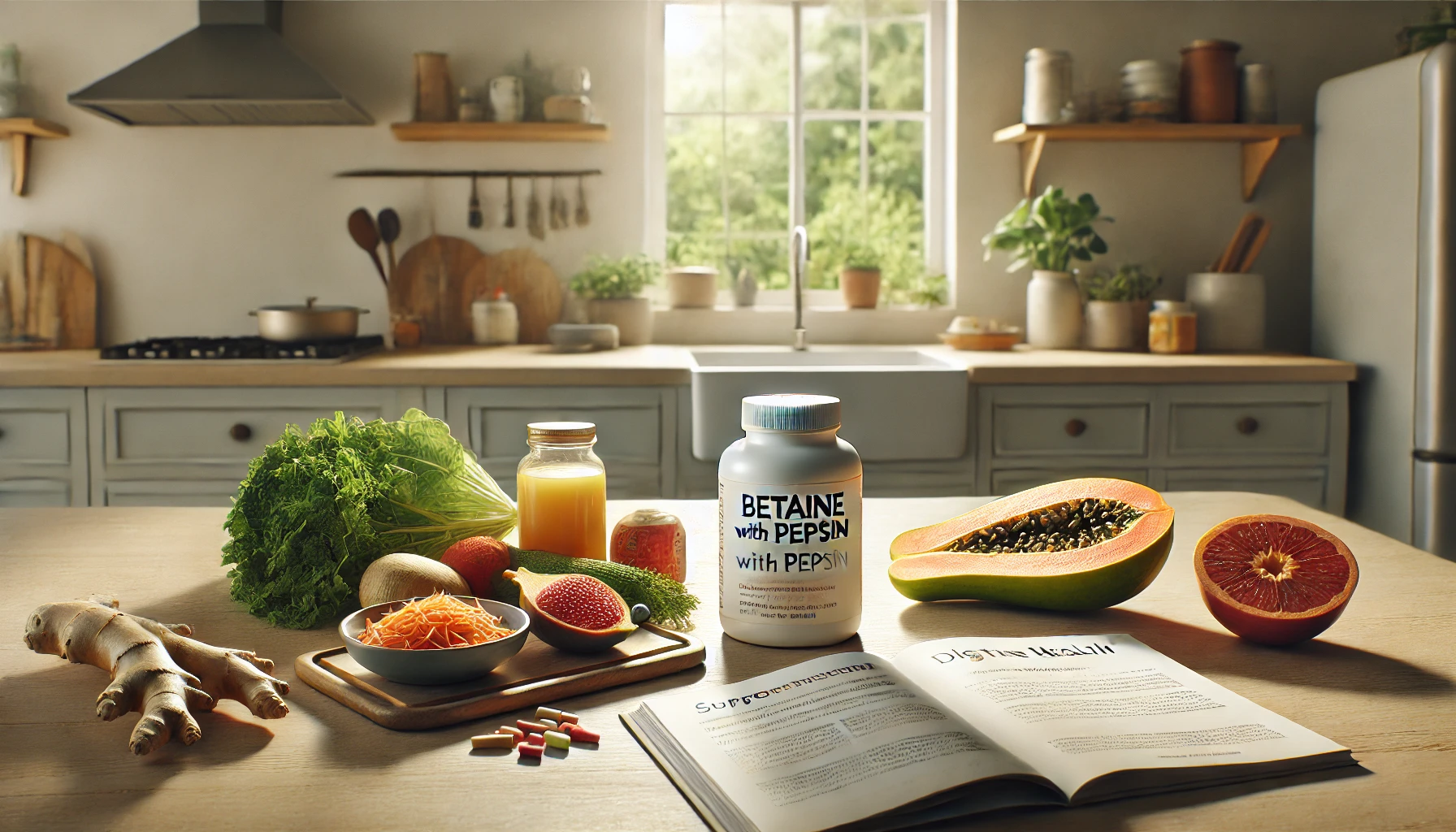I met Hemant a few years ago. He was a vibrant and health-conscious individual, but he always seemed to struggle with digestive issues. Despite his best efforts to maintain a balanced diet and active lifestyle, he often experienced bloating, gas, and a general sense of discomfort after meals. Determined to find a solution, Hemant embarked on a journey of discovery that led him to an often-overlooked and misunderstood cause: low stomach acid.
Through his research and with the guidance of our healthcare professionals, Hemant discovered that Betaine HCL (Hydrochloride) and Pepsin are two supplements that can significantly impact digestive health, particularly for those struggling with low stomach acid. He started taking the supplements in recommended dozes, and is now a healthier man.
In this blog, will explore Betaine HCL and Pepsin, highlighting their role in digestive health and explain how these supplements can help those facing similar challenges as Hemant.
Understanding Betaine HCL and Pepsin
The first obvious question is – what is Betaine HCL with Pepsin?
Betaine HCL is an acidic form of the compound Betaine that is recommended by some doctors as a supplemental source of hydrochloric acid for people who have a deficiency of stomach acid production (hypochlorhydria). It is a vitamin-like substance found in grains and other foods and not a drug. It is therefore, not regulated by the FDA.
Hydrochloric acid is essential for breaking down food, especially proteins, and for absorbing nutrients. Without adequate stomach acid, the digestive process is compromised. This in turn leads to discomfort, such as acidity, bloating, gas and malnutrition.
Pepsin is an enzyme that specifically digests proteins into smaller peptides. It is activated in the presence of stomach acid; which means, that its efficiency is directly related to the level of hydrochloric acid in the stomach.
Together, Betaine HCL and Pepsin enhance the digestive process by ensuring that proteins are adequately broken down and nutrients are absorbed more efficiently.
The Importance of Stomach Acid in Digestion
Stomach acid is critical for several digestive processes. It aids in the absorption of nutrients such as vitamin B12, iron, calcium, and magnesium. It also breaks down proteins into amino acids, which are vital for various bodily functions. Moreover, stomach acid acts as a defence mechanism against pathogens that are ingested along with the food we eat.
Low stomach acid (also known as hypochlorhydria) can lead to symptoms such as bloating, gas, indigestion, and nutrient deficiencies. Roughly one out of four people experience hypochlorhydria, although most don’t realize it. Low stomach acid is often associated with conditions such as gastroesophageal reflux disease (GERD), chronic indigestion, and bacterial overgrowth. These conditions can be easily managed more effectively, if you maintain adequate levels of stomach acid.
It is noteworthy here, that acid reflux is commonly triggered by dietary and lifestyle factors such as consuming fried, spicy, or processed foods, along with alcohol, caffeine, and smoking. Eating right before bed or on a full stomach can also exacerbate symptoms. Additionally, being overweight can put pressure on the stomach, leading to reflux.
Chronic stress disrupts digestion, and a lack of magnesium may prevent proper relaxation of the stomach’s sphincter, causing food to move upwards instead of down. Food sensitivities, bad bacteria or yeast in the gut, and infections like H. pylori are also contributing factors. Overuse of proton pump inhibitors (PPIs) and antacids can further complicate the condition by disrupting normal stomach functions.
How Betaine HCL with Pepsin Can Help
Betaine HCL supplementation helps restore normal gastric acidity and improves the digestive process. It ensures that the stomach has enough acid to break down food properly. Consequently, it alleviates symptoms like bloating and indigestion. Pepsin works alongside Betaine HCL to ensure efficient protein digestion, thereby reducing the burden on the digestive system.
Studies have shown that Betaine HCL with Pepsin can significantly improve digestive health. Clinical evidence supports its efficacy in enhancing nutrient absorption and alleviating symptoms of low stomach acid. By restoring the balance of stomach acid and enzymes, these supplements can provide substantial relief for those with digestive issues.
Who Should Consider Betaine HCL with Pepsin
Certain groups are more likely to benefit from Betaine HCL with Pepsin supplementation. Older adults often experience a natural decline in stomach acid production, making them prime candidates. Individuals with chronic digestive issues, such as GERD or chronic indigestion, may also find relief. Those who have used acid-suppressing medications for a long time, might need these supplements to restore their stomach’s natural acidity.
In order to determine if you might benefit from Betaine HCL with Pepsin, you should track the symptoms and undergo diagnostic tests. Watch out for symptoms such as persistent bloating, gas, and indigestion, especially after meals. These are good indicators. Consult a healthcare professional who will conduct tests to measure your stomach acid levels, and confirm whether you need Betaine HCL with Pepsin supplementation.
How to take Betaine HCL with Pepsin Safely
You should exercise necessary caution before starting Betaine HCL with Pepsin supplementation. It is important to follow dosing guidelines and to take the supplements with meals, in order to avoid potential irritation. Starting with a low dose and gradually increasing it can help determine the optimal amount which will not cause you any discomfort.
We get a lot of questions from patients regarding Betaine with Pepsin side-effects. The fact is, while Betaine HCL with Pepsin is generally safe to take, it can cause side effects in some individuals. These side effects may include stomach pain or a burning sensation.
It is usually advisable to take 1-3 capsules with each meal. If you experience a burning sensation or any other side-effect, or if there is no improvement in your symptoms even after 2 weeks of taking the supplement, you should discontinue it. It is crucial to consult with a healthcare provider before starting these supplements, and it should be avoided if you have peptic ulcers.
Complementary Dietary Changes and Practices
Betaine is naturally present in beet, spinach, wheat bran, wheat germ and aquatic invertebrates. But if you do need to take Betaine HCL with Pepsin supplement, there are certain things you need to bear in mind.
To maximize the Betaine HCL with Pepsin benefits, you should incorporate positive dietary changes and healthy habits. Eating a balanced diet which is rich in whole foods, supports overall digestive health. Avoid processed foods, sugars, meat, gluten and dairy, as they are the most common food allergens. Avoid alcohol, caffeine and nicotine. Keep a gap of 3 hours between dinner and going to bed.
You should also incorporate other digestive aids such as digestive enzymes, probiotics, licorice, Magnesium, and Zinc carnosine to further enhance digestion. Treat your bacterial overgrowth. Probiotics help maintain a healthy gut microbiome, which is vital for efficient digestion and nutrient absorption. Lifestyle adjustments like regular exercise, adequate hydration, and stress management such as deep breathing, also play a crucial role in maintaining optimal digestive health.
Betaine HCL with Pepsin offers significant benefits for individuals experiencing symptoms of low stomach acid. By restoring normal gastric acidity and improving protein digestion, these supplements can alleviate digestive discomfort and enhance nutrient absorption.
Betaine HCl can also help to destroy harmful bacteria in your stomach before they enter your digestive tract. However, it is important to consult with a healthcare professional before starting any new supplement regimen to ensure safety and effectiveness.
If you are interested in knowing more about how to improve your digestive health, feel free to consult with our healthcare specialists to get personalized advice.
Prioritize your digestive health, to enjoy a better quality of life.





2 Comments